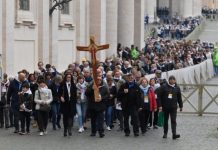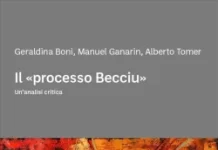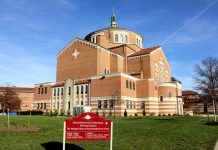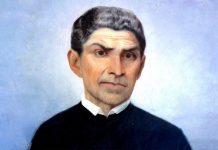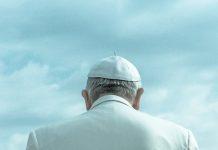Retired Pope Benedict XVI’s longtime personal secretary has given an interview in which he says he believes the devil was working against Benedict throughout his papacy. Still, the scandals which erupted during his reign had nothing to do with his historic resignation.
Newsroom (03/01/2023 9:55 PM, Gaudium Press) — Speaking to the Italian newspaper La Reppublica, German Archbishop Georg Gänswein said the word “scandal” was perhaps “a bit strong” to describe the many crises that erupted during Benedict XVI’s papacy, but that “it’s true that during the pontificate there were many problems.”
From financial and clerical abuse crises to troubles with the Vatican bank and the so-called “Vatileaks” incident in which confidential documents were leaked to the press, “it’s obvious, as Pope Francis would say, that the bad guy, the evil one, the devil, doesn’t sleep,” Gänswein said.
“It’s clear, he always tries to touch, to hit where the nerves are exposed and do the most damage,” he said, saying he could often feel the devil at work, and, “I felt him very against Pope Benedict.”
Gänswein, 66, currently serves as Prefect of the Papal Household and was Benedict XVI’s personal secretary since before his election to the papacy in 2005, meaning he accompanied the late pontiff throughout his eight-year reign and remained with him after his historic resignation and the nearly 10 years since.
Recalling the day when Benedict was elected, Gänswein said he was sitting in a hallway that attaches the Sistine Chapel to the Vatican’s Pauline Chapel during the 2005 conclave when he heard loud applause erupt.
The applause was unusual because “the conclave is not a concert,” he said, saying the sudden eruption could only mean that the cardinals had elected a pope and that the man chosen had accepted.
Shortly afterwards, Gänswein said the large doors to the Sistine Chapel swung open, and he entered the chapel but didn’t know that his boss had been elected until “I saw him, down at the end. He was all white, even his face. His hair was already white.”
Benedict, he said, was already wearing the white papal zucchetto and his white cassock,
“But he was pallid, very pallid. And there, in that moment, he looked at me,” Gänswein said, saying his response was, “Holy Father, I don’t know what to say, congratulations or prayers.”
He then pledged his life to serve the newly elected pope, in life and “until or also in death.”
Arch. Gänswein said he first met then-Cardinal Joseph Ratzinger 27 years ago, in January 1995, in the Vatican’s Teutonic College. The two were making causal conversation when Ratzinger perked up, Gänswein said, when he mentioned that he had studied seven years at the University of Munich.
“My first impression is unforgettable: A strong personality, but very natural. Meek but very, very decisive,” is how Gänswein described his longtime boss.
Reflecting on the day Benedict’s historic resignation went into effect, Gänswein said the first thing that comes to mind is the moment they left the apostolic palace to board the helicopter for Castel Gandolfo.
“I turned out the lights, and this for me was already a very emotional act, but also very sad,” he said, saying he tried to hold himself together, “but the pressure was too big,” and he began to weep, describing the feeling as “a type of tsunami above, under, around. I no longer knew who I was.”
Benedict, he said, “was in a state of incredible calm, as he was in the days preceding.”
Gänswein said Benedict XVI had first confided his decision to resign several months prior, in September 2012, and his first reaction was, “Holy Father it’s impossible. We can think of reducing your commitments, this yes, but to leave, to renounce, it’s impossible.”
He said Benedict let him speak but responded by saying, “you can imagine that I have thought well about this choice, I have reflected, I have prayed, I have fought, and now I communicate to you a decision made, not a thesis to be discussed. It is not a quaestio disputanda, it is decided.”
From that moment, Gänswein said he was sworn to silence.
In hindsight, Gänswein said he recalled that Benedict had been “very closed, very pensive,” since the summer of 2012, which he thought was because the late pontiff was concentrated on finishing the last in his Jesus of Nazareth book series.
“When he revealed his decision to me, I understood that I was mistaken: it was not the book that worried him, but it was the internal battle of this decision, a challenge,” he said, saying things went ahead like normal for the next few months.
Asked if Benedict XVI was referring to the clerical abuse scandals when, shortly after his election, he denounced “filth in the church” while presiding over the Via Crucis at the Colosseum during Holy Week in 2005, Gänswein said, “It must not be forgotten that as prefect he was the first, one of the first, to come into contact with this terrible scourge of abuse.”
“It’s obvious that that experience couldn’t not be present in the Via Crucis of 2005,” he said, recalling how Benedict at the beginning of his papacy asked for prayers so that “I may not flee for fear of the wolves.”
Gänswein said he is unaware of what exactly, or who, Benedict was referring to, but the image of the wolf in that context “means it is not easy to be coherent, counter-current, and maintain this direction if many are of another opinion.”
“Whoever believes that there can be a calm papacy I think has mistaken their profession,” he said.
Arch. Gänswein also rejected rumors that the crises which erupted during Benedict’s papacy, and the intense criticism he endured, were factors in his decision to resign. He said he once asked Benedict about it, and the response was, “No, the question never influenced my resignation.”
“Feb. 11, 2013, I said my motives: I lacked the strength to govern. To guide the church, today, strength is needed, otherwise it doesn’t work,” was Benedict’s response, Gänswein said.
He also clarified some details of the 2011-2012 Vatileaks scandals, saying the private documents stolen by Benedict’s former butler, Paolo Gabriele, were not removed from the pope’s desk but from his own, and that he had offered Benedict XVI his own resignation afterwards.
“Unfortunately, I realized far too late, too late,” he said, saying Benedict rejected his resignation, saying even Jesus was betrayed by Judas, and that “We are a small group, here, and we’ll stay together.”
Gänswein also denied rumours that Benedict resigned as a result of threats, and said Benedict’s 2009 visit to L’Aquila – which had been devastated by a massive earthquake and which is the burial place of Pope Celestine V, the last pope to resign the papacy before Benedict himself – was not tied to Benedict’s own decision several years later.
When Benedict placed his pallium – a woollen garment he received at his papal installation and which is worn by archbishops – on top of Celestine’s tomb, it was “an act of great honor to Celestine. But it has nothing to do with the act of resignation which became reality some years later. I exclude a link,” Gänswein said.
Responding to critics who frowned on Benedict’s decision to resign while his predecessor, John Paul II, continued to reign while openly afflicted by the effects of Parkinson’s, Gänswein said Benedict was never bothered by the comparison.
“He told me once: I cannot and do not want to copy the model of John Paul II in sickness, because I have to face my life, my choices, my strengths. This is why the pope allowed himself to make this decision, which to me required not only a lot of courage, but also a lot of humility,” he said.
Gänswein said the decision to announce Benedict’s resignation on Feb. 11 was made to coincide with the feast of Our Lady of Lourdes, and that prior to the announcement, the day began like normal.
“We celebrated Holy Mass, recited the breviary, made breakfast, and the pope prepared for the consistory. I helped him put on his mantle with the stole, then I accompanied him with a small elevator to the apartment of the second gallery,” he said.
As the morning activities transpired, “We did not speak, nothing. So, the silence was absolute, because it was not the moment for words,” he said.
Benedict chose to make his announcement in Latin, Gänswein said, because he insisted that “an announcement like that must be made in the language of the church, the mother tongue.”
“You heard from his voice that the pope was moved and tired, both things,” he said, saying he began to notice “movement” among the cardinals when Benedict began to speak in Latin, and that some understood “there was something strange” happening faster than others.
By the time the former dean of the College of Cardinals, Italian Cardinal Angelo Sodano, who passed away last year, got up and responded to Benedict, saying his announcement came like lightening in a clear blue sky, “everyone realized what was happening,” Gänswein said.
In terms of Benedict’s post-retirement title of “pope emeritus,” Gänswein said it was chosen by Benedict himself.
“I think that faced with a decision so exceptional, to return to cardinal would not have been natural. But there is no doubt that there was always only one pope, and he is called Francis,” he said.
Benedict’s resignation, he said, shows that “the sacred is sacred, and it also has human aspects.”
“I believe that with his resignation Pope Benedict also demonstrated that the pope, if he is always the successor of Peter, remains a human person with all of their strengths, but also with their weaknesses,” he said, saying, “one is needed, but you must also live the other. Because strength is needed to accept one’s own weakness.”
- Raju Hasmukh with files from Crux Now








